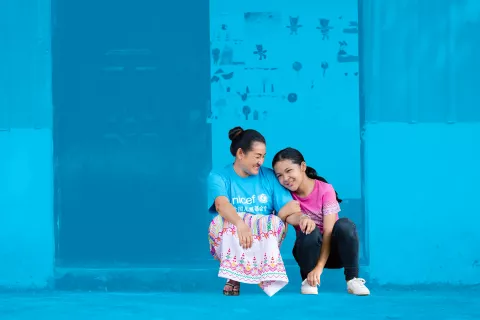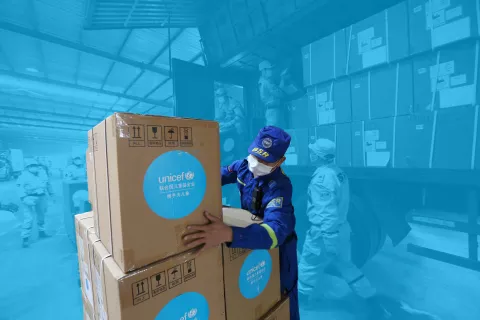Social Policy
Every child deserves an equitable chance in life.

- Available in:
- 中文
- English
Challenges
Overlapping deprivations continue to prevent children’s rights from being fully realized and stop children from reaching their full potential.
The major challenges UNICEF, the Government of China, and partners are working together to solve are:
| Poverty and inequality |
By 2020, China had successfully reduced extreme poverty and lifted millions of rural residents out of poverty. Amid this success, overlapping deprivations persist for some children. This hampers children’s development and limits what they can achieve in their lifetimes. The harmful effects of COVID-19 have not impacted children equally. They are most damaging for children who are already in disadvantaged or vulnerable situations. |
| Social assistance | Despite significant progress and ongoing reform efforts, China’s social assistance system still faces challenges. These challenges include a lack of a legal foundation, limited coverage, inadequate benefits, and a lack of linkages to social services. Support is exclusively provided in cash, without a sufficiently large and qualified social worker cadre to reach, inform, and assist households. More work is needed to reduce fragmentation among programmes, and to make the system more child sensitive. There is also a need to increase policymakers’ understanding of the multidimensional needs of families and children. |
| Basic health insurance |
Basic health insurance mitigates risks to children’s health and development, and it contributes to social and economic development. High out-of-pocket healthcare expenditure increasingly contributes to putting children into vulnerable situations. Enrolling the most marginalized in health insurance coverage, defining and expanding the minimum package of free health services, and enhancing the portability of insurance benefits remain challenges to ensuring universal basic health insurance for all. Maternity insurance is limited and favours women in formal employment, leaving out those in informal employment and the unemployed. More work is needed to increase the efficiency of implementation. |
| Essential services for children | The rate of access to some essential services (like education and health) has improved but remains relatively low. There are persisting inequities in access between urban and rural areas, across regions, across population groups, and across services. |
| Inequity in public financial management and governance | Although clarified in some social service areas, the division of financial power and responsibility between central and local governments is still not clear enough, and the mechanism for central government transfer payments is incomplete. The quality and accessibility of essential public services still need improvement in terms of public financial management and governance. |
| Children in urban areas |
Rapid and large-scale urbanization has brought prosperity and opportunities. But it has also brought a range of challenges to children and young people living in urban areas. Challenges include a limited understanding of the interaction between children’s behaviours and their urban living environment, disparities in access to services and protection, limited child participation in policymaking and urban planning, and unsustainable built and natural environments for children. |
Solutions
Together with the Government of China and partners, UNICEF will work to ensure that fewer children in China experience multidimensional deprivation by providing greater access to quality and affordable social protection and social services.
This includes:
| Address multidimensional deprivations of children |
Including children in national measurement and monitoring of development, so that resources can be focused on specific groups of children in the design of policies and programmes. Targeting measures at the most vulnerable groups of children, tailored to meet their developmental needs. Integrating social protection and other sectoral programmes including education, health and child protection to support every child. |
| Reform social assistance system | Responding to the changing nature of vulnerability and addressing the multidimensional needs of children and their families, while strengthening the policy design, implementation, monitoring and evaluation of the social assistance system. |
| Advocate for a more child-sensitive medical insurance scheme |
Exploring ways of equitably increasing medical insurance coverage for children, defining and expanding the minimum package of covered health services, and reducing out-of-pocket expenditure. Improving the coverage and efficiency of maternity insurance policies, and mitigating the gender biases embedded within them. |
| Strengthen the essential services related to children and their families | Clearly defining the contents and delivery standards of essential social services; developing a solid and equitable legal, institutional, and public financial management framework for efficient and effective financing and governance; developing a robust monitoring and evaluation framework to feed into policy design and implementation. |
| Build Child Friendly Cities |
Supporting national governments in developing a Child Friendly City (CFC) system that is aligned with international principles and contextualized to China’s situation, as well as helping achieve the objective of 100 CFC demonstrations by 2025 outlined in China’s 14th Five-Year Plan. UNICEF’s technical support will also be provided to sub-national governments while moving towards CFCs. |
Resources
These resources on social policy represent just a small selection of materials produced by UNICEF and its partners in the last two years. The list is regularly updated to include the latest information.
- BASIC MEDICAL INSURANCE FOR CHILDREN IN CHINA
- FAMILY POLICIES IN CHINA
- Multidimensional Child Deprivations
- UNICEF's work to address deprivations, of all dimensions, for every child
- Child Multidimensional Poverty in China: from 2013 to 2018
- Putting Children First
- Promoting the Development and Implementation of the Putting Children First (PCF) Principle in China Advocacy Note (2020)
- Towards a World Free from Child Poverty
- Child Friendly Cities and Communities Handbook
- Shaping urbanization for children – A handbook for child-responsive urban planning
- Child and Youth Participation – Options for Action
- Global Review of Management Information System Practices
- How to foster a caring society for children and families in China
- Reimagining Social Policies to Support Families in China





